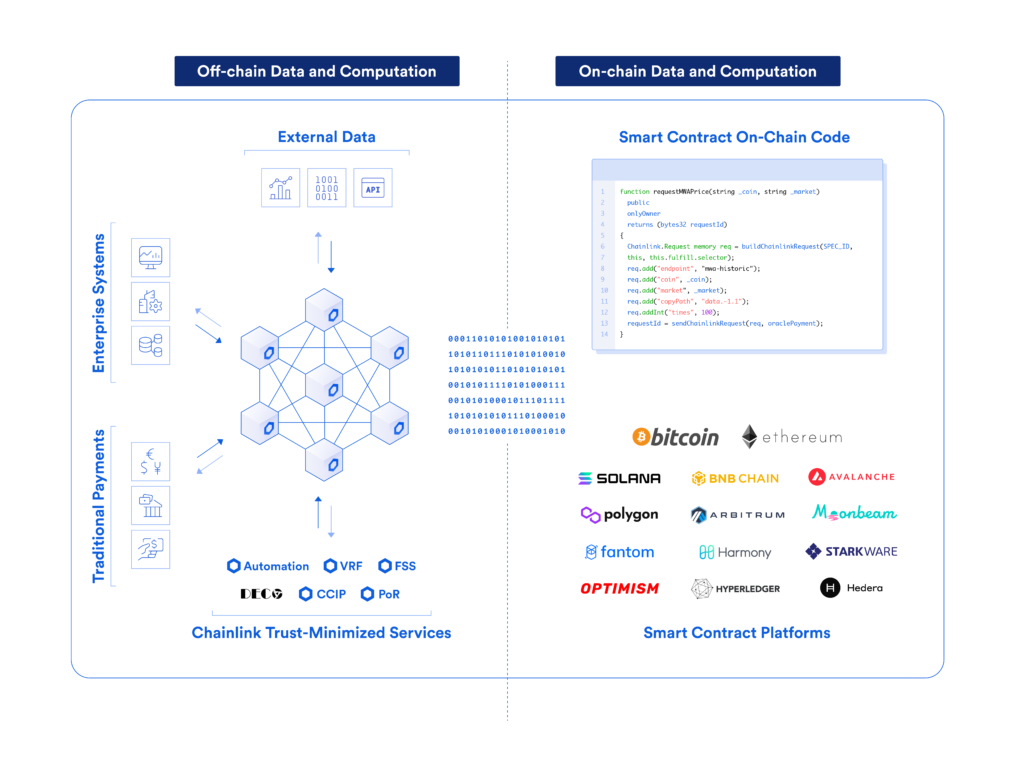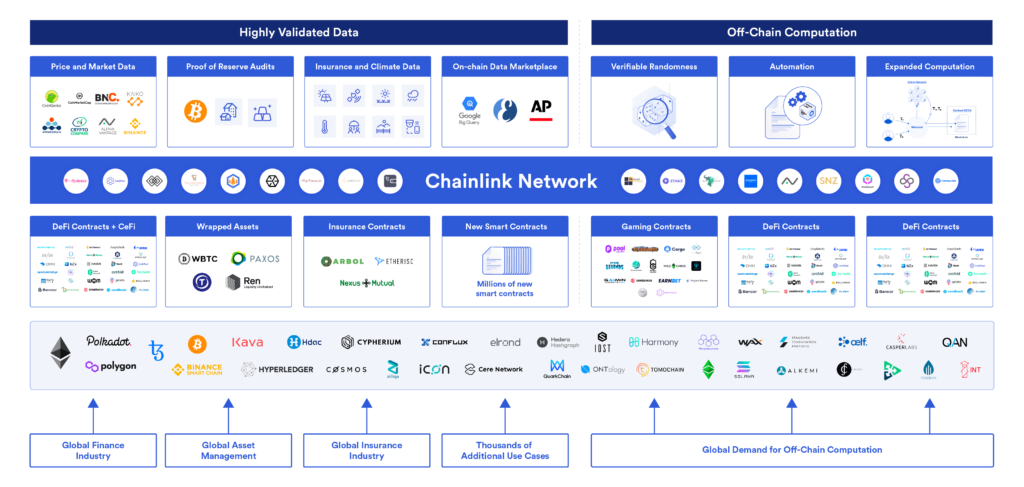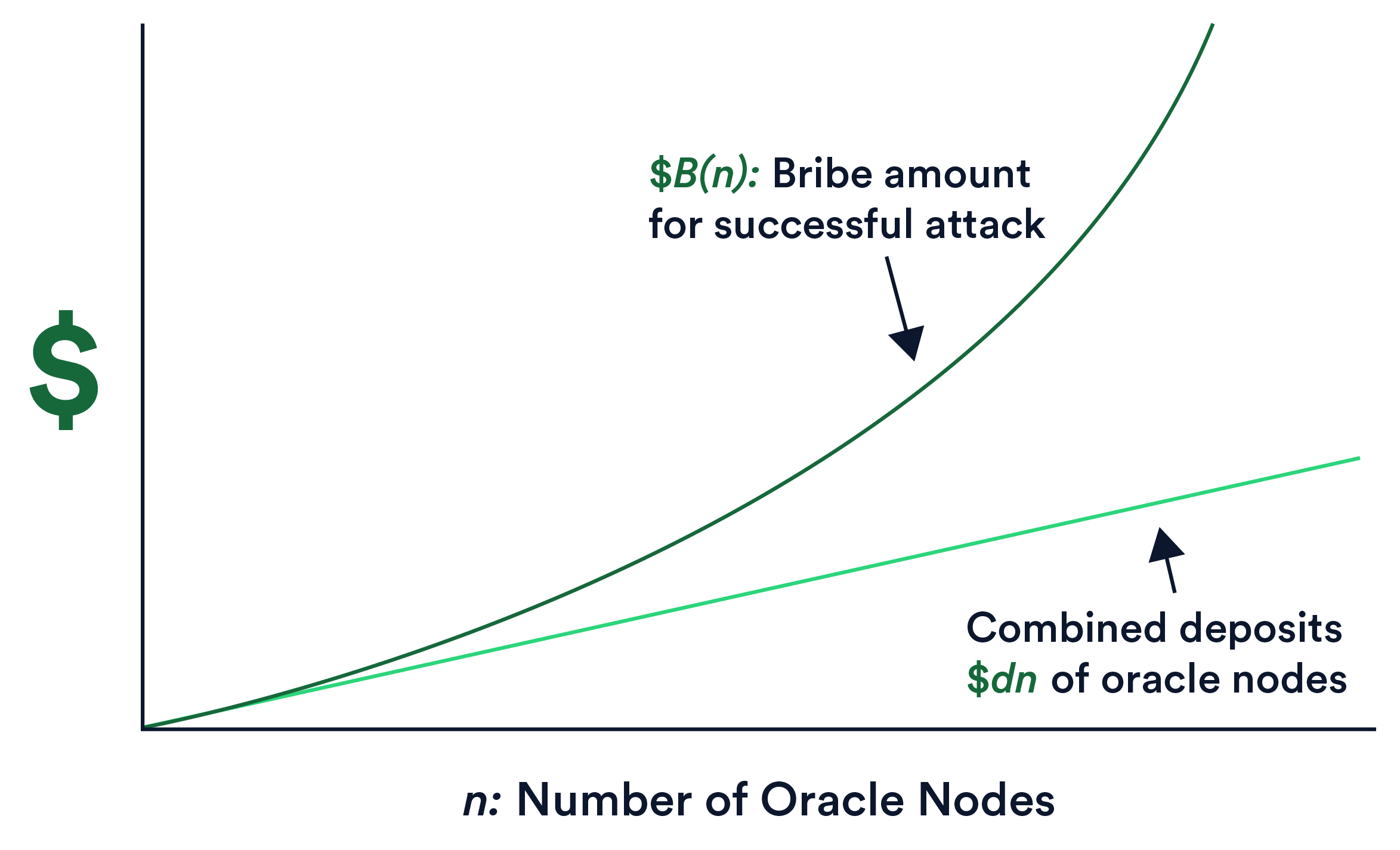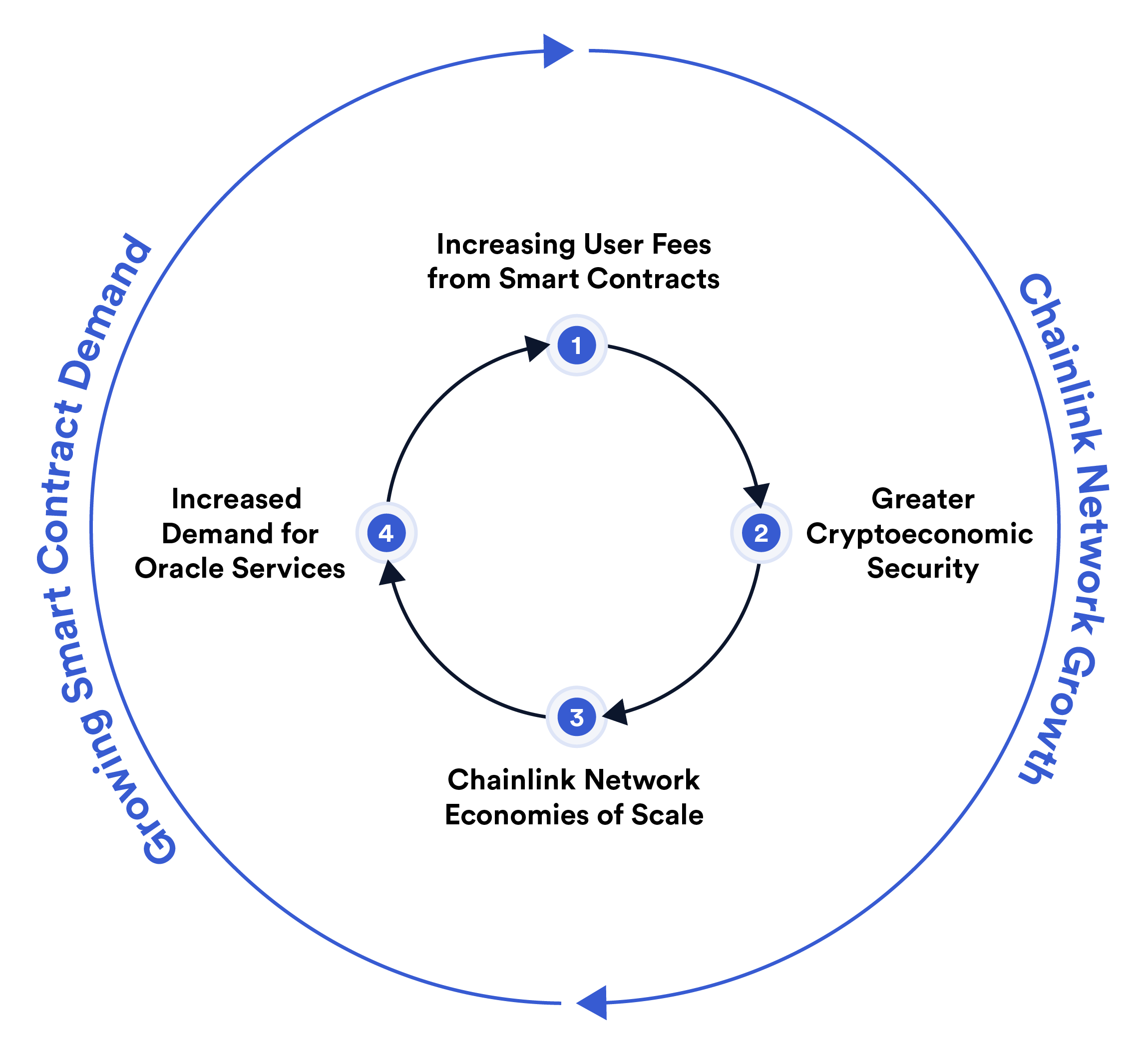Chainlink 2.0 Lays Foundation for Adoption of Hybrid Smart Contracts
Since the release of the original Chainlink whitepaper over three years ago, Chainlink has grown into the most widely used decentralized oracle solution throughout every emerging smart contract vertical, including DeFi, insurance, gaming, NFTs, and more. The expanding suite of decentralized services available on the Chainlink Network is fueling innovation across numerous leading blockchains, providing developers with an array of key oracle functions:
- Chainlink Price Feeds provide an extensive collection of on-chain financial market data for a broad array of assets, which is used to secure billions of dollars for leading DeFi applications like Aave, Synthetix, and dYdX.
- Chainlink VRF generates verifiable randomness backed by on-chain cryptographic proofs, enabling projects like Aavegotchi to mint NFTs with provably rare attributes and PoolTogether to fairly select winners in its no-loss lottery.
- Chainlink Proof of Reserve supplies on-chain data feeds that enable smart contracts to perform on-demand audits of tokenized asset reserves, such as for stablecoins like TUSD and PAX and cross-chain tokens.
- Chainlink External Adapters give developers the tools to create connections to any off-chain resource or API, leveraged by Arbol’s parametric crop insurance market to fetch weather data and Everpedia’s prediction market users to get U.S. election results.
The Chainlink Network has achieved an expansive network effect through widespread adoption in the decentralized oracle market and is already securing billions in on-chain value. While it’s been no small feat to get to this point, we have only scratched the surface of what’s possible with decentralized oracle networks and the smart contracts they support.
In order to lay out an ambitious vision for the future of oracle-enabled smart contracts, we present Chainlink 2.0: Next Steps in the Evolution of Decentralized Oracle Networks—a new whitepaper that outlines how Chainlink Decentralized Oracle Networks can go on to create a decentralized metalayer that enhance smart contracts with highly scalable, confidential, and secure forms of off-chain computation, in addition to the external data that Chainlink already provides today.
The whitepaper introduces a new architecture for building hybrid smart contracts, where Decentralized Oracle Networks offer key capabilities that blockchains cannot, serving as a secure off-chain computation layer that partly relies on blockchains for security yet operates with the connectedness, feature-richness, and scalability of off-chain systems. The result of this new abstraction layer is a growing suite of Chainlink Decentralized Services that power a vast array of secure, feature-rich smart contract applications capable of supporting a much broader set of users and use cases.

To read the Chainlink 2.0 whitepaper, click the button below or visit https://chain.link/whitepaper, which also offers a broad overview of the paper’s design goals and the future of the Chainlink Network.
The Chainlink 2.0 whitepaper was written by a team of world-class academic researchers specializing in fields like security, cryptography, distributed systems, game theory, mathematics, and various other computer science related disciplines. The team is headed by Ari Juels, previously Chief Scientist of RSA and now Chief Scientist of Chainlink Labs, and includes contributions from Lorenz Breidenbach, Christian Cachin, Benedict Chan, Alex Coventry, Steve Ellis, Farinaz Koushanfar, Andrew Miller, Brendan Magauran, Daniel Moroz, Sergey Nazarov, Alexandru Topliceanu, Florian Tramèr, and Fan Zhang.
In this research panel, whitepaper co-authors Ari Juels, Lorenz Breidenbach, Andrew Miller, and Sergey Nazarov walk through the major technical advancements in Chainlink 2.0.
Redefining the Function of Decentralized Oracle Networks
The original Chainlink whitepaper pioneered decentralized oracle networks, generally seen as a way to feed external data into the blockchain in a secure and reliable manner. The Chainlink 2.0 whitepaper creates a framework for multiple interoperating Decentralized Oracle Networks (DONs), which each consist of a collection of nodes that can transfer data bidirectionally and perform decentralized off-chain computation using various consensus protocols. Similar to layer-2 technology, Chainlink DONs are anchored to existing blockchains in order to periodically sync the data outputs and state changes computed off-chain, as well as establish guardrails that enforce correct oracle reports and arbitrate off-chain oracle disputes.

The more advanced off-chain computation described in the whitepaper allows DONs to provide a universal, blockchain-agnostic gateway for smart contracts to not only access any off-chain resource but also an off-chain computing environment for code execution that either cannot be performed on a blockchain or is not feasible to do on-chain due to various constraints like cost, speed, privacy, and technical limitations. Thus, DONs within the Chainlink Network serve as a secure and flexible full-stack solution for the creation of hybrid smart contracts that rely on existing on-chain code and combine it with critical off-chain computations. These hybrid smart contracts enable decentralized applications to achieve major upgrades in scalability and confidentiality, both of which are key to large-scale blockchain adoption.
- Scaling: DONs will compute oracle results and parts of contract execution off-chain, while syncing periodically with an existing blockchain network or layer-2. This allows Chainlink Decentralized Oracle Networks to achieve the low latency and high throughput performance required to service blockchains, layer-2 networks, and even traditional Web 2.0 systems.
- Confidentiality: DONs allow for multiple forms of confidentiality, such as confidentiality-preserving connectors between on-chain and off-chain systems, as well as confidential computation of smart contracts and oracle data.
How Chainlink DONs Will Power DeFi and the Wider Smart Contract Economy
The enhancements brought about through DONs will enable Chainlink to support a variety of decentralized services that power next-generation smart contract use cases. Additionally, the oracle services that the Chainlink Network provides today will be further enhanced through the advantages provided by DONs. A brief initial list of these advanced decentralized services include:
- Hybrid Smart Contracts that are seamlessly connected to all necessary off-chain resources, while retaining increased levels of privacy and being secured by your preferred blockchain or layer 2.
- Enhanced Chainlink Data Feeds that provide higher-frequency updates, privacy-preserving queries, and multi-blockchain delivery, all of which lower costs and empower DeFi applications like derivatives protocols and enterprise solutions with an even more secure and reliable source of external data. Chainlink Data Feeds are already being made more scalable through OCR.
- Enhanced Chainlink VRF with enhanced security, cryptoeconomic security, and cost-efficiency to support more secure gaming, NFT minting, and any other applications that require a secure source of randomness for end-to-end security.
- Chainlink Automation provides decentralized and highly reliable execution of key smart contract functions like harvesting yield and triggering liquidations, currently being primed for production and tested by top projects.
- Chainlink Fair Sequencing Services (FSS) that use DONs to order user transactions on a blockchain as a means of mitigating front-running, back-running, and other related attacks, as well as other types of transactions like oracle report transmission caused by miner-extractable value (MEV).
- Chainlink Decentralized Identity in which privacy-preserving oracle protocols interoperate with existing systems in a backwards-compatible manner to open up new use cases like on-chain credit-based lending.
And many more additional decentralized services created by various additional DONs.
Chainlink Cryptoeconomic Security

The Chainlink 2.0 whitepaper introduces the concept of super-linear staking, a key advancement in staking mechanism design. Super-linear staking requires an attacker to have resources greater—specifically for Chainlink, quadratically greater—than the combined security deposits of all DON nodes in order to succeed. Through a unique concentrated alerter system and a two-tier adjudication system, DONs provide greater cryptoeconomic security guarantees that overcome powerful adversaries that other systems do not protect against.
As the Chainlink ecosystem continues to expand, we believe that its attractiveness to users and importance as infrastructure for the blockchain economy will accelerate various virtuous cycles, driving more data on-chain and enabling DONs to offer new services to smart contracts. This growth in value derives from both economies of scale—greater per-user cost efficiency as service volumes increase—and network effects—an increase of network utility as users adopt DONs more widely. As described in the whitepaper, we believe that the growth in network security driven by virtuous cycles in Chainlink staking mechanisms exemplifies larger patterns of growth that the Chainlink network can help bring about in an on-chain economy for decentralized services.

For more information on super-linear staking and the other forms of cryptoeconomic security being developed, refer to Section 9 of the whitepaper.
What’s Next
This whitepaper is a long-term, multi-year view of how Chainlink will evolve. This ambitious vision for the Chainlink Network will be implemented incrementally with new decentralized services being released in parallel, so we can formally analyze the security impact of this vast array of new oracle functionalities. We’re confident that Chainlink will enable smart contracts to take the next major leap in their evolution, powered by a hybrid on-chain/off-chain architecture. Just as Chainlink’s secure data oracles have unlocked innovation across the DeFi ecosystem, Chainlink 2.0’s expanded Decentralized Oracle Networks will empower hybrid smart contract developers to build the scalable and privacy-preserving decentralized applications that mainstream users have been waiting for.
To join the discussion around Chainlink 2.0 and its impact with other researchers and engineers across the community, visit the Whitepaper Research Summary on the Smart Contract Research Forum.
Website | Docs |Discord | Newsletter | Twitter | Reddit | YouTube | Telegram
